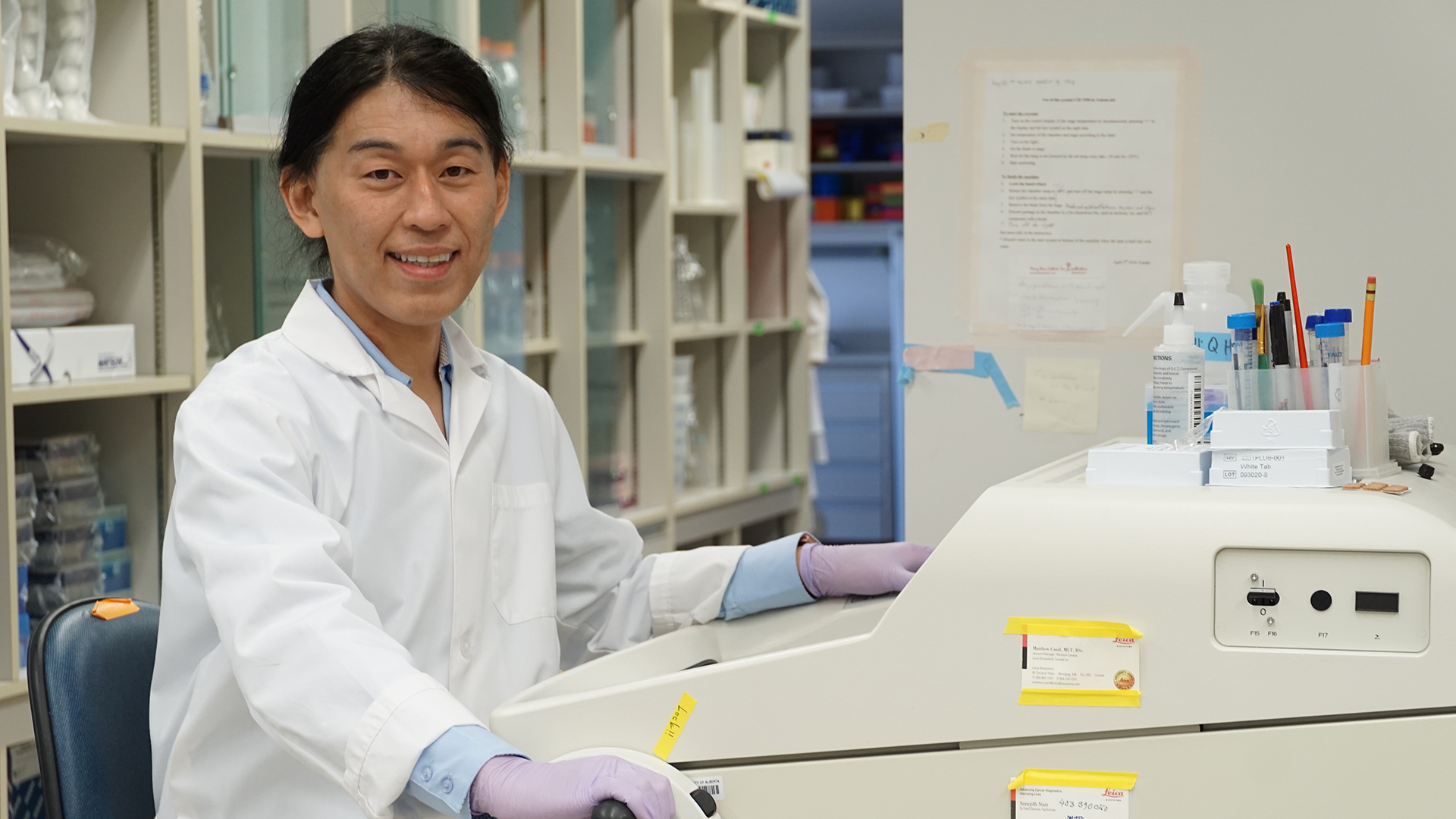Online resource will speed up development of new approach to treating genetic diseases
Keri Sweetman - 29 June 2021

Toshifumi Yokota
A University of Alberta researcher and several international collaborators have developed an important tool and database to accelerate the growth of exon-skipping therapy, a promising new approach to treating genetic diseases.
Toshifumi Yokota, a professor in the Department of Medical Genetics, is one of the scientists behind eSkip-Finder, the first machine-learning-based online tool and database of synthetic molecules called antisense oligonucleotides (ASOs). ASOs are critical to exon skipping therapy.
Exon skipping is a precision medicine technique by which one or more of the protein-coding exons in a gene is ‘skipped’ to mitigate the effects of genetic mutations. The synthetic ASOs act like a stitch or Band-Aid to restore the gene function by reorganizing genetic information.
Yokota, who has a PhD from the University of Tokyo, has been studying ASOs and exon skipping since he did post-doctoral training at Imperial College London. While there, he demonstrated for the first time that ASO-mediated exon-skipping therapy could restore gene function and improve muscle strength in a severe animal model of Duchenne muscular dystrophy (DMD).
In 2011, Yokota was recruited to the U of A, where he holds both the Friends of Garrett Cumming Research/Muscular Dystrophy Canada and the H.M. Toupin Neurological Science research chairs. His work in exon skipping offers hope to patients suffering from DMD, a lethal genetic disorder affecting one in every 3,500 boys worldwide. They rarely live beyond their 20s and 30s.
While much of Yokota’s research has focused on DMD, he stresses that ASO-mediated exon skipping could be used to potentially treat many other genetic diseases.
The U.S. Food and Drug Administration (FDA) has already approved four ASOs for DMD, including viltolarsen, which was developed by a Japanese pharmaceutical company based on Yokota’s research. Clinical trials of viltolarsen were conducted in Japan, the U.S. and Canada, and it is being used clinically on DMD patients in Japan and the U.S.
The current FDA-approved ASOs could lead to successful treatment of about 25 or 30 per cent of DMD patients. “That’s progress,” said Yokota. “But to treat more patients, we need to develop more ASOs, customized depending on the patients’ mutations.”
More than 7,000 mutations have been identified in DMD patients.
Many researchers and pharmaceutical companies around the world are developing new customized ASOs for DMD and other genetic diseases. But they face significant challenges, including selecting an optimal target sequence for exon skipping. The efficacy of ASOs is often unpredictable because of numerous factors.
The eSkip-Finder is intended to address these challenges. It uses machine-learning algorithms that factor in many parameters and experimental data to predict the exon-skipping efficacy of newly developed ASOs. The online resource also offers a database of previously published ASO research to help scientists speed up their work.
“Now that we have published eSkip-Finder, people all over the world can use this tool to design and develop new ASOs for the treatment not only of DMD but also for many other genetic diseases,” explained Yokota.
He and his collaborators describe their new tool in a paper published in Nucleic Acids Research. The lead author is Shuntaro Chiba, a computer scientist in Yasushi Okuno’s lab at the RIKEN Center for Computational Science in Japan. Nine students and researchers in Yokota’s U of A lab and two researchers in Yoshitsugu Aoki’s lab at the National Center of Neurology and Psychiatry in Japan, and William Duddy at Ulster University in the U.K., are also named as authors.
While the development of new ASOs has been limited because of the challenges of the research, Yokota expects the eSkip-Finder tool to accelerate this emerging therapy. Dozens more ASOs could be approved by the FDA in the next decade, he said, offering the prospect of customized treatment to DMD patients and millions of others suffering from genetic diseases.
This work was supported by Grants-in-Aid for Research on Nervous and Mental Disorders. Yokota’s research was also supported by the Stollery Children's Health Foundation through the Women and Children's Health Research Institute (WCHRI). Other funders include the Canadian Institutes of Health Research, Alberta Innovates and Jesse’s Journey, a DMD charity group based in London, Ont. Along with being a member of WCHRI, Yokota is also a member of the U of A’s Neuroscience and Mental Health Institute.